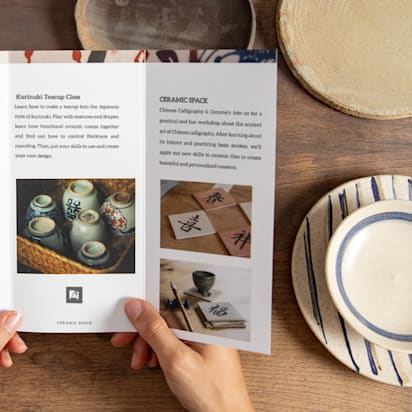Brochures are a great way to communicate to target customers what your business is about and what you offer. Whether you print detailed information about your services or use it as a menu, a brochure provides ample space to tell your brand story. If you’re wondering how to make a brochure, just follow these steps for brochure creation to showcase your business or product in the best light.
- A brochure is a folded printed marketing material containing text and visual elements used to convey information about products, services or a brand to a target audience.
- Defining your brochure’s purpose and audience will guide your design and messaging. Knowing who you’re speaking to helps tailor your content to their interests and needs.
- Choose a fold style like bi-fold or tri-fold based on how you want to present your content. Each type of fold offers a different layout that can help highlight key points and make your brochure easy to navigate.
- Use high-quality visuals and concise text to keep your message clear and engaging. Strong visuals will draw attention, while short, impactful text ensures your message is easy to understand.
What is a brochure?
A brochure is a printed marketing or promotional material used by businesses and organisations to convey information about their products, services or brand to a target audience.

Colorful brochure design
Brochures typically consist of folded sheets of paper that contain text, images, graphics and other visual elements designed to inform, engage and persuade the reader.
Business brochures serve various purposes, including:
- Marketing and promotion
- Information dissemination
- Event promotion
- Educational materials
- Brand awareness
- Sales support
The following sections will outline what to include in your brochure, brochure layouts and a step-by-step guide on how to create brochures, from researching your target audience to printing brochures.
What should be included in a brochure?
To create a business brochure, you’re going to need content. So, before you get started with brochure creation, make a folder where you’ll have these essentials at hand.
Cover page content
The cover page of your business brochure is where you start building that important first impression.
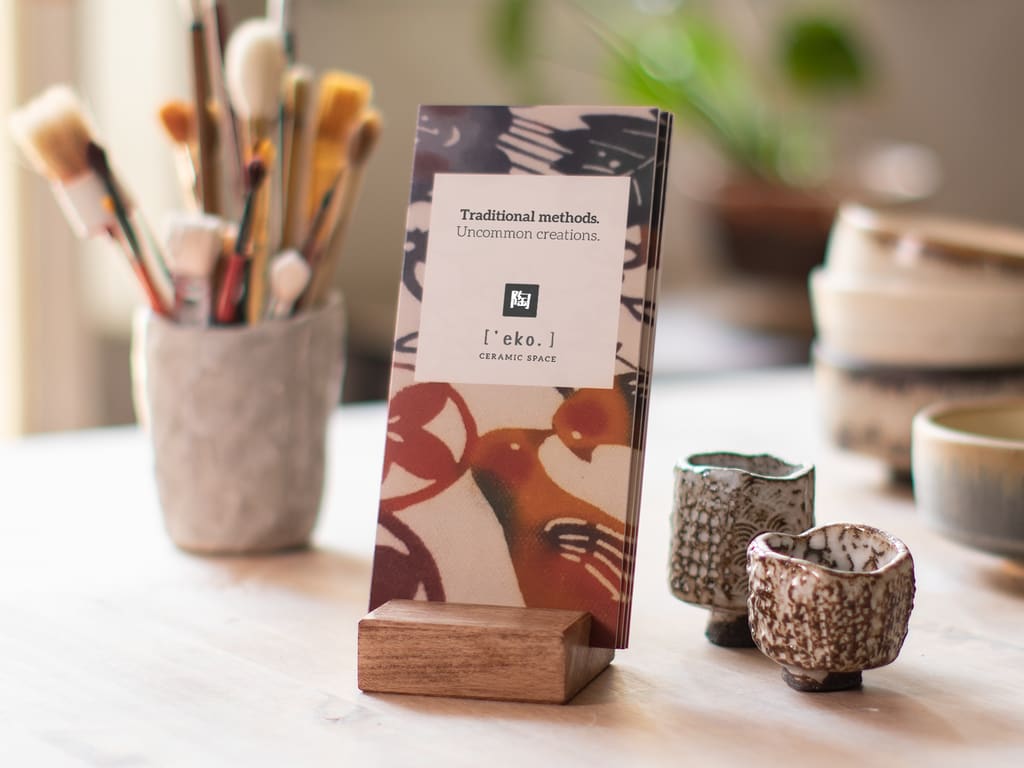
On the cover page of your brochure, include:
- A catchy headline or slogan: Pique curiosity and get potential customers interested in your brand.
- Great visuals: Choose relevant images or graphics, and make sure they’re clear and sharp.
- Your logo: Print your company logo front and centre in the highest resolution possible.
Don’t have a logo yet? Read our article on how to choose a logo for your business and check out our logo design services.
Inside pages content
Once you’ve chosen the assets for your brochure’s cover page, it’s time to focus on what goes inside.
Images
Select a few high-resolution photos of your products or services, and maybe even one of you or your team.
Copy (text)
Your message is important, so spend time drafting what you want to say in advance and make tweaks later. Your brochure copy should include:
- Intro/About us: The introductory section of your brochure serves as the opening statement, providing readers with a concise overview of your brand’s mission and values.
- Services/Products: Offer a comprehensive overview of the range of services or products your business provides. Include detailed descriptions and eye-catching images, and highlight the key features of each offering.
- Benefits: This is where you show how your products or services can improve your customers’ lives by solving their problems or meeting their needs.

If you want a multi-page brochure packed with information, you can also add the following elements:
- Testimonials: Social proof can help reassure readers that your products or services deliver genuine benefits. Include quotes or testimonials from satisfied customers or clients. Use real names and, if possible, photographs of the people providing the testimonials.
- Team: Make your brand even more trustworthy by putting a face to the name. Provide the brief profiles, photos, qualifications, expertise and roles of key team members.
Keep brochure copy concise—that’s how to create a brochure that leaves a lasting impression.
Content for the back of your brochure
Write a strong call to action (CTA) and your contact details on the back page of your brochure so your audience knows how to contact you and what to do next.
- Contact information: Include your business address, phone number, email, website URL or social media handles.
- Call to Action (CTA): Encourage readers to take action, such as contacting you, requesting a quote or visiting your website. Use action-oriented language, like “Call us today” or “Visit our website for more information.”
How to create brochures that customers will hold onto? Include useful resources, a map or even a mini-calendar.
How to make a brochure layout
With your content prepared, start creating a clean and easy-to-read brochure layout. This is where the art of brochure design comes into play. Achieving an effective brochure layout is crucial to engage your audience and convey your message clearly.
Look at brochure examples for inspiration on layout and refer to our guide on how to design a brochure.

Plan the information hierarchy
Establish a clear information hierarchy. Identify the most important pieces of content and arrange them logically. Use headlines, subheadings and body text to guide readers through the information.
Implement a grid system
For visual consistency, use a grid system that serves as the foundation for your layout. This grid will help you align text and images consistently. Think of it as the invisible structure that keeps everything in place.
Craft smooth page transitions
Consider the flow of the pages of your brochure—ensure that readers can easily follow the logical sequence of information as they progress through your brochure. Keep in mind how your layout will appear when the brochure is folded, making sure the important content stays visible on each panel to create an easy-to-follow reading experience.
Create text boxes and image frames
Text boxes for your written content and image frames for images and graphics create a neat look, while consistent spacing and alignment will give your brochure a professional feel. Boxes and frames ensure your brochure doesn’t look too cluttered, and the information is presented in easily digestible chunks.
Strike a balance between text and visuals
Avoid overwhelming readers with an excessive amount of text or images on a single page. Strive for a balanced layout where text and visuals work harmoniously to convey your message effectively.
How to make a brochure step-by-step
Now it’s time to learn how to make a brochure. Let’s walk through the process step by step, helping to bring your business brochure to life.
Step 1: Determine your brochure’s objective
Clarifying the purpose of your brochure helps emphasise your key message and ensures the effectiveness of your printed brochure.
Consider what you aim to accomplish with your brochure…
- Is it primarily to promote a particular service, perhaps highlighting its unique benefits?
- Are you looking to introduce your audience to the exciting new features of a product?
- Will your brochure provide essential information about your business or organisation, such as your history, mission or values?
- Is the brochure an invitation, providing details about an upcoming event and encouraging people to attend?
Exploring these questions will help clarify your brochure’s purpose and lay a solid foundation for crafting a brochure that resonates with its target audience.

Step 2: Understand your target audience
To better understand how a business brochure can help you achieve your goals, it’s important to learn what your target audience looks for in marketing materials. Firstly, ask yourself whether your target audience reads brochures. Other marketing materials, like flyers or pamphlets, might engage their attention more effectively.

Before moving on to how to create a brochure, you need to figure out:
- The specific demographics of the people you want to reach with your brochure.
- The key problems or challenges your audience faces that your product or service can help solve.
- What information is your audience looking for in your brochure?
- The tone of voice that appeals to your audience. Is it formal, informal, friendly or professional?
- Audience incentives for engaging with your business. Perhaps they are driven by discounts, convenience or feeling part of something?
- Where your audience is most likely to find and engage with your brochure, whether in-store, by mail, via other local businesses or handed out at events and trade shows.
Step 3: Create an outline of your business brochure
Now that you understand your audience and objectives, map out the outline of your brochure. Creating an outline will help keep your content focused, organise your content and engage your audience. A roadmap will also help allocate time, budget and people power for more efficient brochure creation.
In your brochure outline, include the sections or topics you intend to address, as well as any visual elements, such as images or graphics, that you plan to incorporate. Don’t forget a compelling call to action (CTA).
Step 4: Create the brochure copy and visuals
Once you’ve laid out the brochure outline, start creating your brochure’s content. Maintain consistent branding with your color palette, logos and brochure fonts, ensuring your brochure aligns with your brand identity, building brand recognition.

To make your brochure copy more engaging:
- Divide text into paragraphs: Break up your content to enhance readability and engage readers.
- Try to connect with your reader: Use second-person pronouns like “you” to directly engage the reader and create a more personal feel.
- Use an active voice: Writing actively rather than passively will enhance readability.
- Keep it brief: To ensure your message is impactful, convey essential information clearly and succinctly while avoiding unnecessary details.
When it comes to the brochure’s visual elements:
- Consider using custom images: Hire a designer to produce custom graphics aligned with your brand that differentiate you from your competitors.
- Avoid using stock photos: Otherwise, you risk using the same images as your competitors and not standing out with your business brochure.
For both copy and images, double-check that your brochure’s content is relevant to the message you want to convey, on-brand and accessible to your target audience.

Step 5: Choose the fold of your brochure
Brochure folds, such as bi-fold, tri-fold and Z-fold, offer distinct layouts and are best suited to specific communication goals.
A bi-fold consists of two panels, making it simple and cost-effective. It’s ideal for conveying essential information when you have limited content or want to focus on a single message, like a menu or price list.
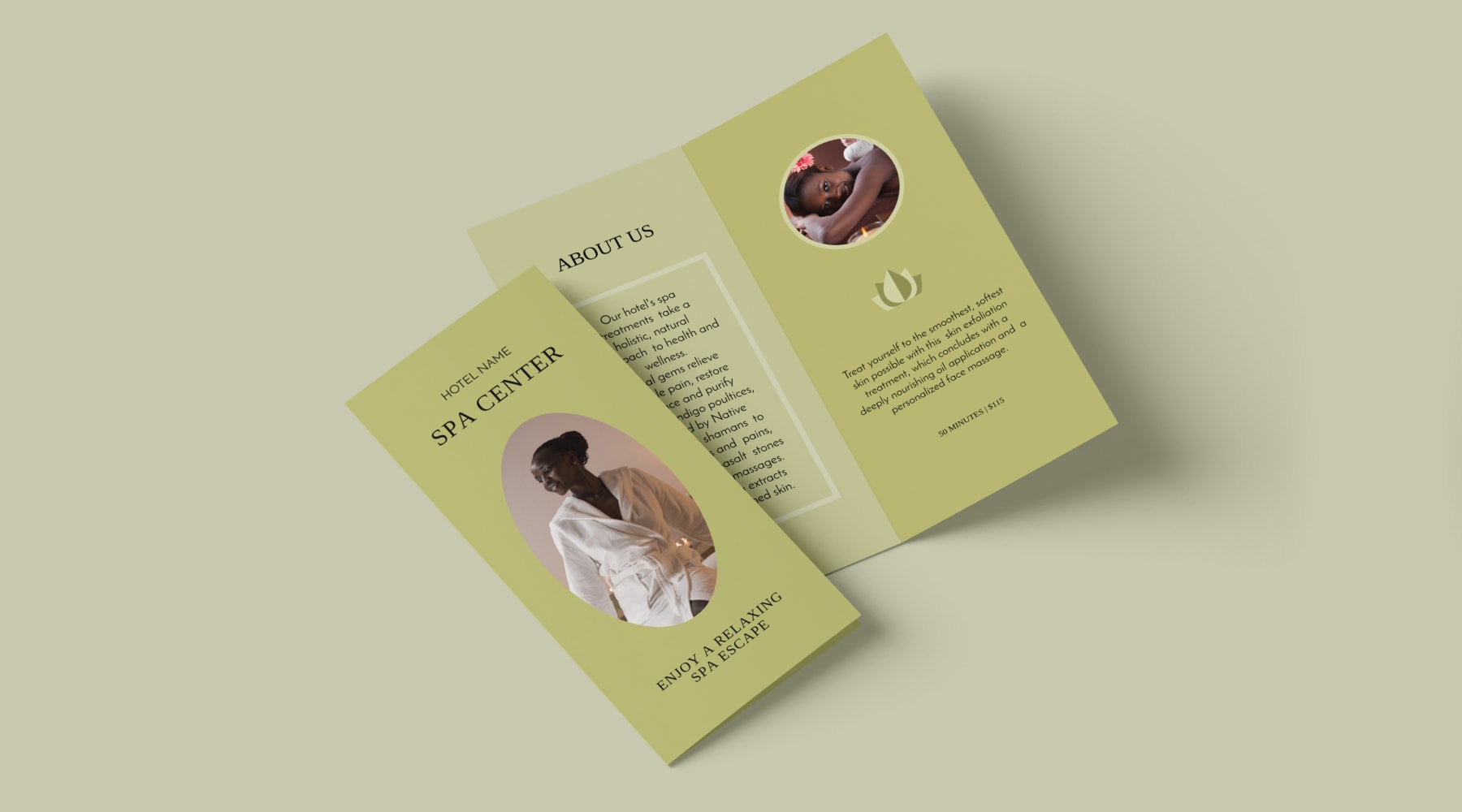
A tri-fold, with six panels, provides more space for content. It’s versatile and commonly used for brochures that balance visuals and detailed information. Tri-fold brochure templates are great for product catalogs, event programs and service offerings.
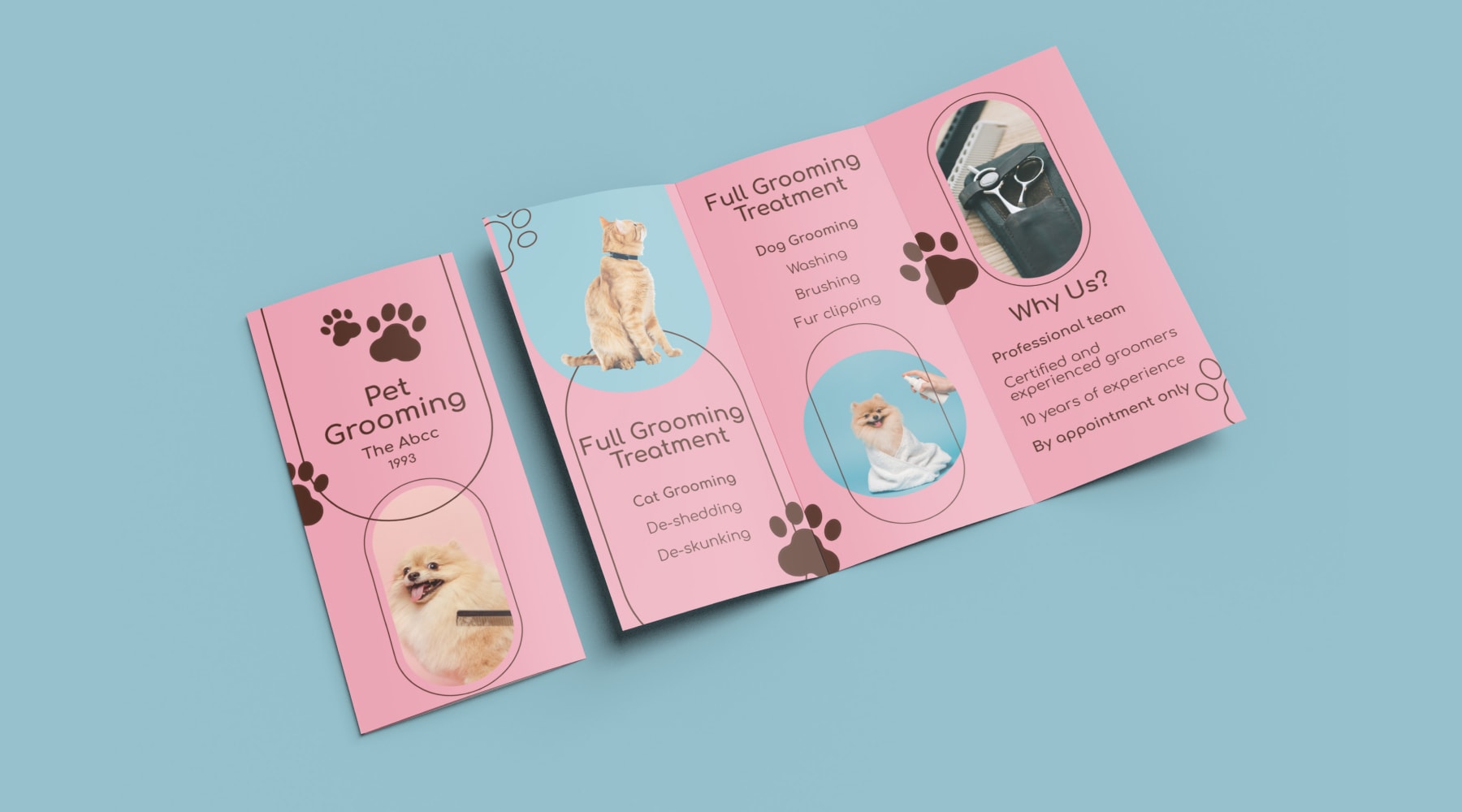
Lastly, the Z-fold is known for its eye-catching presentation. It zigzags when unfolded, revealing three panels on each side. It’s excellent for brand storytelling or to guide readers through a sequential narrative, like a journey or process.

Choosing the right fold depends on your content and objectives:
- Use a bi-fold brochure for simplicity and clarity
- Use a tri-fold brochure for versatility and balance
- Use a Z-fold brochure for impactful storytelling or sequential information
Step 6: Customise a brochure template
While you can design your brochure from scratch, you don’t have to start from a blank page. Instead, you can browse VistaPrint’s gallery of ready-made brochure design templates, pick the one best-suited to your brochure goals and customise it to match your brand identity.

Step 7: Prepare your design document with a safety area
When creating a print-ready file, include a safe area and crop marks, making sure the design goes all the way to the edge (full bleed size) while keeping important text and images safely inside the designated area.
Step 8: Order a test print of your business brochure
Before finalizing your design and sending your brochure to print, create a test copy to ensure the quality of your brochure. Because printed colors sometimes look different from what you see on your computer screen, printing a test copy can help assess if the colors in your brochure match your brand guidelines or design intentions. You can also check the paper stock, texture and finish to ensure they meet your expectations.
A printed test copy is an excellent opportunity for a final proofread. Review the text for typos, grammatical errors or any content-related issues that may have been missed during the digital review. It also allows stakeholders to provide feedback on the printed brochure, rather than reviewing digital mock-ups.
Step 9: Print your brochure
Once you’ve approved your brochure design, it’s time to print. To ensure high-quality marketing materials, print your brochures with trusted printing services like VistaPrint. When sending your brochures off for printing, you’ll need to choose paper thickness, brochure size and paper stock.
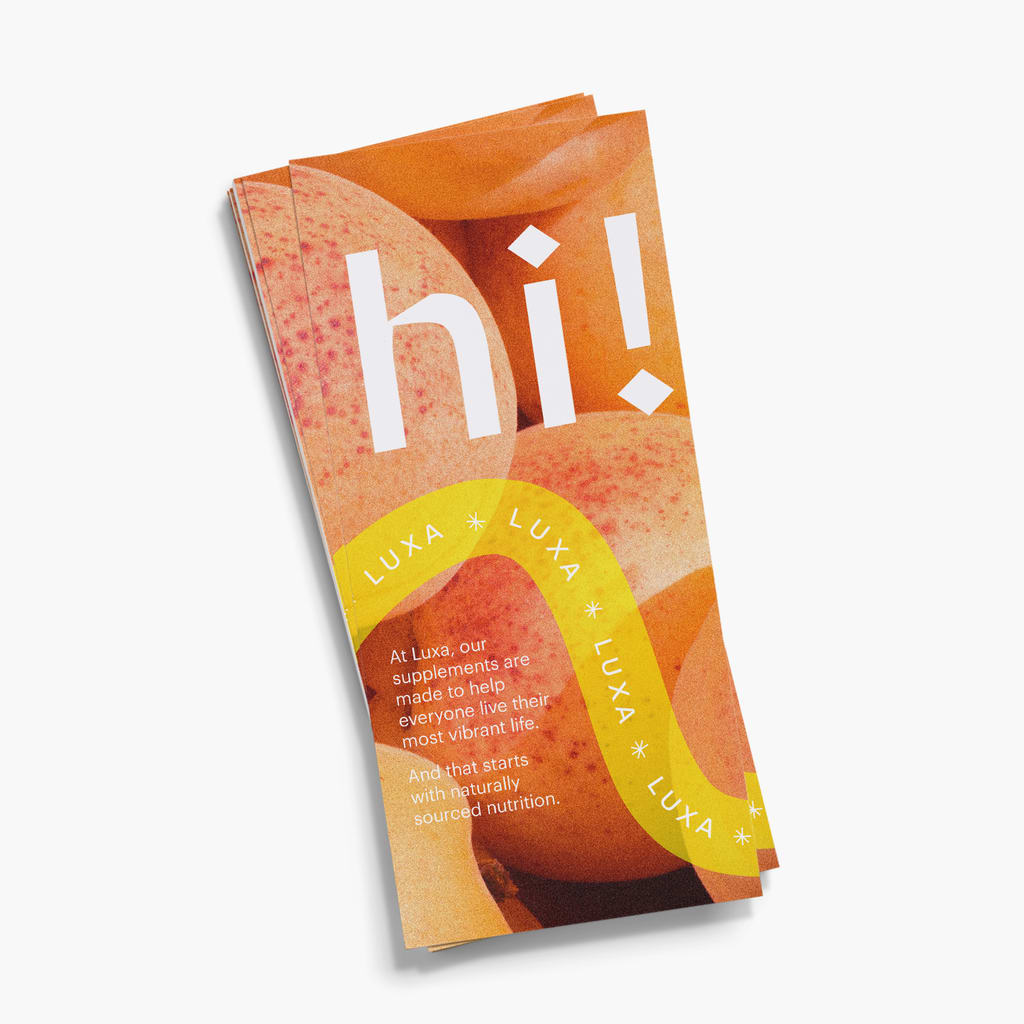
Brochures usually come in four types of paper stock, each with its pros and cons:
- Glossy finish: The best option for brochures with vibrant colors or photos, but glossy paper can be reflective and difficult to read in bright light, so it’s not ideal for text-heavy designs.
- Matte finish: Perfect for simple black-and-white designs or high-contrast color combinations. Some people think it looks more professional than glossy, making it a good choice for corporate brochures.
- Uncoated paper: Natural and easy to read and write on, uncoated paper is versatile and useful for scribbling down contact information at an event.
- Recycled paper: Made from 100% post-consumer recycled material, recycled paper has a textured finish. An eco-friendly choice for environmentally-conscious businesses.
Ready to make a brochure?
Seeing your brochure come to life is exciting, but the real value comes when you start putting it to work. Display your brochures at well-chosen locations to attract potential customers, and hand them out at your place of business or events. Whatever you choose to do with them, you’ll find your brochure is one of your proudest and most versatile marketing materials.
Brochure creation FAQs
How do I make a brochure for my business?
To make a brochure for your business, determine its purpose and target audience. Choose a brochure layout and template that suits your content, add high-quality images, write concise and engaging copy, and include key information like services, contact details and a call to action.
What are the different types of brochures?
The most common types of brochures are bi-fold, tri-fold and Z-fold, each offering different panel configurations for presenting content in a visually appealing way. Other types of brochures include formats designed to communicate specific information such as restaurant menus, service price lists and event programs.
What is the difference between a brochure, flyer and pamphlet?
A brochure is a multi-page folded document used for detailed information, whereas a flyer is a single, eye-catching sheet used for quick promotions, and a pamphlet is a small booklet focused on informing or educating audiences.
What should I include in a brochure?
Include your business logo, a catchy headline, a brief introduction, detailed information about your products or services, testimonials, contact details and call to action.
What is the best size for a brochure?
The most popular brochure sizes are 8.5″ x 11″ for a tri-fold, 8.5″ x 14″ for more detailed content and 11″ x 17″ for larger layouts that require more space.
Should I print my brochure or share it digitally?
It depends on your marketing goals. Printed brochures are great for in-person distribution, while digital brochures are cost-effective and easy to share via email or on your website. Many businesses opt for both formats for maximum reach.






